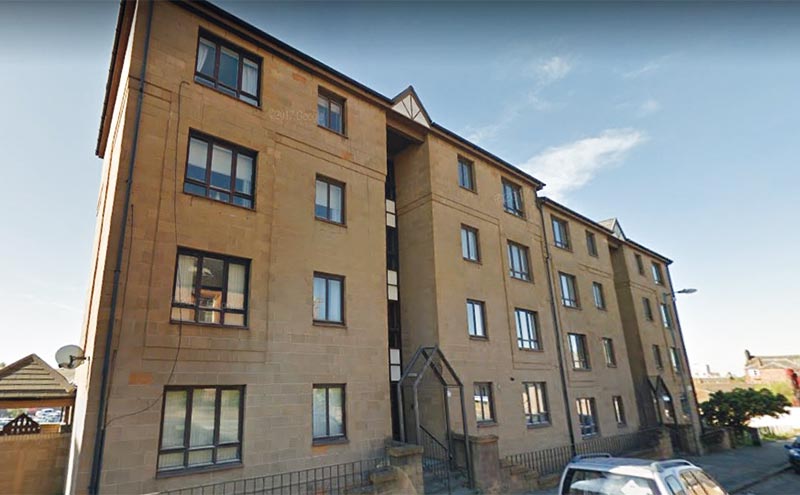
A Glasgow-based factor has implemented a model of property maintenance it claims can save residents thousands of pounds while allowing for numerous improvements to be made.
Aquila Management Services is a construction company with a property factoring division. The factoring side of the business was set up at the request of the owners of a block of flats at Muiryhall Street, Coatbridge.
Paul Clark, a quantity surveyor by trade, and owner of Aquila, initially managed 16 flats over a ten-year period. He then took on the block’s other 32 flats in 2015, following the serving of a section 50 notice by North Lanarkshire Council. Since taking on the full block, Paul claims to have greatly reduced the building’s insurance policy and carried rendering works on the exterior.
Paul told Project Scotland, “A section 50 notice, or a missing share, comes into play when essential works of a sizeable nature need to be made to common properties. In essence, if due diligence and procedure is followed, each owner would part-fund a project and the local authority would fund a further proportion. In our case, North Lanarkshire Council funded 50% and the owners the remaining 50%.
“In the event that an owner would or could not pay, and due to the safety requirement of the works needing done, the council would utilise the section 50 notice on the properties and pay his missing share. A missing share is the full amount and not 50%, as those paying would receive.
“The full amount would remain on that particular property’s title deeds until it is sold, plus interest of approximately 10% per annum. The section 50 would be seen at the point of sale as remaining on that single property and the missing share and interest returned to the council at a later date by the selling owner.”
The notice was served due to spalling blockwork on the exterior of the property and £230,000 was required to carry out the works.
Paul continued, “Someone was walking along a pathway and a chunk of brick fell off a windowsill and narrowly missed them. They reported it presumably to the council and they put in a private contractor to go around and test every square inch of blockwork on the property and probably took off about 10% of the block work because when you hit it, it was hollow underneath. It was a facing block that was on it, so it was all starting to come away and then the weather was getting at it and it was worsening and worsening.
“We all decided something had to be done about it and we began to look into ways to make the repairs, but we soon realised that we couldn’t get a grant without a factor. We didn’t want the current factor to have anything to do with it, so we did it on our own.”
The Enewall render system – a scrim and pin system designed to secure the spalling and defective blockwork – was specified for the remediation project and Airdrie-based Renderworks carried out the works. This was followed by the application of a coat of dry dash finish. Other works carried out included the painting of external common areas; fixing lead work and missing roofing; minor electrical work; guttering; and demolition of bin stores.
“It’s been a phenomenal success,” Paul added.
Paul was also keen to voice his concerns regarding what he called “the factoring stramash that exists in Glasgow”.
“I found out when we came into Aquila and we had to renew our insurances for the first time last year, that the insurances on the 32 flats that were still with the factor were nearly £10,000. When Aquila came on-board we renewed all 48 with a better policy and a lower excess. They renewed the whole lot for £2,900 – so you have to ask yourself the question, ‘Why was it £10,000 and why was it £2,900?’ Well, one of the things that factors do is they take a commission on the insurances.”

He continued, “If you’re getting a 25% commission and that doesn’t get taken off the residents, they get it from the insurance company. Where is their incentive for them to lower your policy? Surely a high policy with a higher commission would financially benefit the company who is running the factorship?”
Paul said Aquila’s model of operation was “quite different” to that of a traditional factor. He explained, “It’s quite a money-saving scheme for the owners and it allows them to actually make improvements to their properties. We formed a co-operative residents’ association, and instead of the factor having the money paid into his bankbook via direct debit from the individuals, we decided it would be the community that would take money weekly and then they would feed the money back to the factor as and when they wanted the factor to carry out repairs.
“My job as the factor was almost a project manager to look after the block; to make sure the insurances were in place; to employ the gardener; to employ the cleaner; and ask for that money from the residents every week.
“I would challenge any factor to prove to me that you could make better improvements than what we’ve done on our own. The moment we took it on board, we pushed the boat out and we made something quite good happen.”
Aquila has recently taken on its second block of residences in Caldercruix.
Project Scotland spoke to the operations director of a major Glasgow factor, which manages over 500 buildings and developments, to respond to Paul’s comments.
They said, “Property factors in Scotland are regulated by The Property Factors (Scotland) Act 2011 and Code of Conduct. If any factor earns a commission from any service they provide, this must be disclosed in compliance with the Property Factors Act.
“Factors tend not to be qualified contractors or surveyors; their role is to act as agents on behalf of the co-owners. They manage the repair and/or maintenance works by appointing the appropriate contractors, ensure the scope of works compares with the invoiced charge, and apportion the appropriate share to each co-owner. Impartial assessments can be obtained by instructing independent service providers, if required.
“A surveyor assesses the reinstatement value of a building and provides an independent report. Insurers provide quotes based on this report and quote the annual premiums. I would have to question whether the £2,900 premium does provide the required cover, which includes the communal areas, and is based on the correct reinstatement value. A factor uses a broker to search for the best all-round deal for the co-owners, which fundamentally includes an efficient claims process. It is the broker who earns the commission from the insurer. The factor will negotiate with the broker to obtain a proportion of the broker’s commission. The factor is able to do this because it takes a share of the administration in-house. This arrangement does not affect any quote provided to co-owners.”
They added that while what Aquila has achieved is commendable, it “can be equally achieved by the formation of a democratically elected residents’ committee, acting within an agreed constitution, that is committed to working in partnership with their factor for the mutual benefit of all co-owners, with the added benefits of regulation and protection”.
Paul said that his company too utilised a broker and increased the reinstatement value on the properties, lowered the premium and excesses and paid commissions back to the owners. He also said that, while he agreed that residents’ committees could work, they have no teeth unless the factor changes its model. He also called for more impartiality and openness from factors.
“My experience of three factors is that they have their own closed panel of contractors. It is very difficult to get on such lists; they are essentially closed shops. We actively encourage co-owners to take on some of the works, which saves money and also acts as an extra pair of eyes and ears on the site.
“Our model puts the association in charge of the money and all decisions. It utilises the factor’s professionalism and expertise to run the projects that the residents decide upon.”
Paul added, “I would question why any factor should claim any commission, when he is already charging a management fee. Commissions only encourage a sales ethos and do not encourage the factor to be a consultancy.
“We are a tiny cog in the Glasgow factoring system, but we do seriously intend to show a better way of working for all residents that challenges the existing model, and shows homeowners that the can act together and change factors.”








